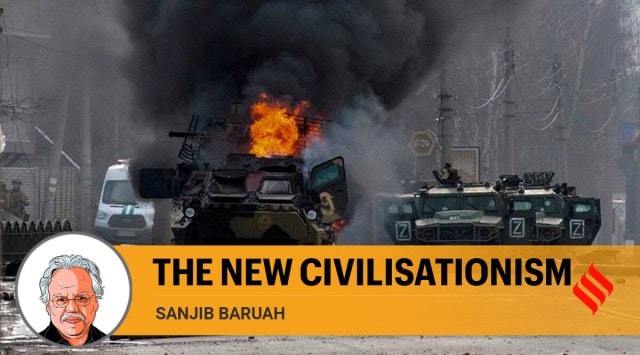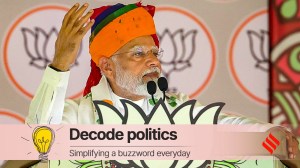- India
- International
The dangerous intellectual fad of ‘civilisationism’
Sanjib Baruah writes: It is an effort to expand or narrow an imagined ‘us’ against an equally imagined ‘them’.
 In the case of Russia, the statement that “Russia is not just a country, it’s really a separate civilisation” has been attributed to President Vladimir Putin himself. (AP/Representational)
In the case of Russia, the statement that “Russia is not just a country, it’s really a separate civilisation” has been attributed to President Vladimir Putin himself. (AP/Representational)Civilisationism is an intellectual fad sweeping across the corridors of power in important capitals around the world. Since civilisations are the broadest cultural entities into which the human species is often divided, one would have expected civilisationism to transcend nationalism. Yet the civilisational rhetoric of today is mostly an exercise in rebranding nations — an effort to expand or narrow an imagined “we” against an equally imagined “they”.
The civilisation-state is now counterpoised to the nation-state. India, China, Russia, Turkey, and Iran are among countries where either state officials or influential personalities close to the governments in power have made statements to the effect that their countries are civilisations unto themselves and not nation-states.
In the case of Russia, the statement that “Russia is not just a country, it’s really a separate civilisation” has been attributed to President Vladimir Putin himself. There is a direct link between the civilisational idea that the Russian world is not limited to the geographical borders of Russia and the irredentist claim that Ukraine is not a real state. It was the ideological motivation and impetus for the Russian invasion of Ukraine.
It is perhaps not a coincidence that countries that have tried to find a middle ground on the Russo-Ukraine war are also aspirational civilisation-states. Does the entanglement with civilisationism at home produce a level of inchoate sympathy with fellow civilisationists abroad?
What do these aspirational civilisation-states have in common? They are relatively large countries that are often described as middle powers, regional powers, or even would-be superpowers. The territories of these countries were once home to ancient civilisations and great empires and kingdoms in the pre-colonial era. The documentary record of that history — notably, the corpus of classical texts — survived the onslaught of the Western conquest. A contrast can be drawn with three great civilisations of the Americas — the Aztec, Mayan, and Inca — most of whose codices or manuscripts did not survive the depredations of the European conquest. In terms of social practices, however, continuities with the pre-colonial era are as evident in the Americas as in countries of the Old World.

While the contemporary claimants to a civilisational identity are relatively large countries, smaller entities too have occasionally made such claims. For instance, the Naga leader Angami Zapu Phizo, who proudly asserted that “Nagas are not Indian, and we have never had anything to do with India”, said in support of this claim that “we have our own culture and civilisation, which our forefathers developed centuries ago. . . It has stood the test of time”.
Portuguese politician and author Bruno Macaes makes the claim – surprising at first glance — that even the European Union (EU) “is in the process of being reconfigured as a civilisation-state, a political entity aggregating all those who live by a specific value system and using political tools to protect European civilisation from the attacks of its enemies”. Macaes says, rather tellingly, that he first became aware of this quiet transformation when his fellow European politicians began saying that Europe is the best place in the world to live.
Macaes’s emphasis on a particular value system as being foundational to Europe’s civilisational identity points to a view that civilisationism, like nationalism, also has its good and bad versions. In a 1945 book, Hans Kohn, a pioneer scholar of nationalism, made a controversial distinction between Western and Eastern nationalisms. Only Western nationalism, he argued, was connected to the Enlightenment’s legacy of the free individual; the nationalisms of Central and Eastern Europe and Asia were not.
A crude version of the European civilisational rhetoric is a key facet of the political stance of national-populist politicians like Victor Orban of Hungary and Donald Trump of the United States. They openly tried to define their country’s borders in civilisational — and effectively racial — terms, not in terms of what international law requires or forbids. Right-wing populist politicians in a number of European countries now talk of a European civilisational identity. They even embrace Christianity, though not in a religious sense, and a few cherry-picked elements of liberalism — including the public disavowal of anti-Semitism — as parts of their European identity. The talk of a civilisational identity allows them to maintain a studied silence on race.
The late historian Eric Hobsbawm once compared the historians’ relationship to nationalism with that of poppy-growers to heroin addicts: “We supply the essential raw material for the market”. Nations belong to the era of political modernity and they are all necessarily young, but “what makes a nation is the past, what justifies one nation against others is the past”. Since historians produce the past, “my profession”, said Hobsbawm wryly, cannot avoid getting entangled in political controversies. Unsurprisingly, this applies to civilisationism as well.
But if civilisations are utilised in the service of nationalism, what happens to the promise of the civilisational idea as a higher order principle for judging the nation-state as a political form? Some reflections by philosopher Sarvepalli Radhakrishnan, made nearly a century ago, relate to this question. In Kalki or the Future of Civilisation, Radhakrishnan wrote, “Before we can build a stable civilisation worthy of humanity as a whole it is necessary that each historical civilisation should become conscious of its limitations and its unworthiness to become the ideal civilisation of the world”.
When one juxtaposes the haughty civilisation talk of today against the state of our planet, Radhakrishnan’s appeal to humility becomes prophetic and compelling. In 1929, when that book came out, Radhakrishnan had reasons to be optimistic about the future of the planet: “Astronomers tell us that there is no reason to suppose that this planet will be uninhabitable”. But in our era of climate crisis, the ongoing death and loss from the pandemic, and surging global and intra-country inequality, it is hard to harbour this optimism.
One can only hope that the civilisationism fad soon becomes passé and that the world embraces a new, just, and peaceful form of planetary politics.
(The writer is professor of Political Studies at Bard College, New York)
EXPRESS OPINION
More Explained
Apr 23: Latest News
- 01
- 02
- 03
- 04
- 05









































